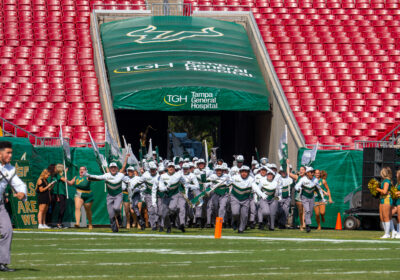Dining halls more “meh” than “ew”

ORACLE PHOTO/MCKENNA KELLEY
Ask any incoming college freshman about their time at orientation, and they are bound to tell you one of two things.
“The food was good,” or, alternatively, “the food was bad.”
Eating in the dining halls is part of the quintessential college experience. New students approach the dining halls with either enthusiasm or wariness, depending on what they’ve heard from the media or friendly upperclassmen, or perhaps what they’ve tasted for themselves.
Some students said their siblings warned them about less-than-spectacular food quality.
“My sister was in college, and she told me ‘oh, the dining hall sucks. You’re gonna get really annoyed with it really quick,” said Victoria Escandell, a freshman majoring in marine biology.
Overwhelmingly, freshmen seem to be entering college with the idea that dining hall food is boring at best and inedible at worst. Mario Reyes-Munoz, a first-time-in-college student majoring in mechanical engineering, said he was not expecting gourmet meals on campus. Similarly, first-time-in-college business and finance major Gisselle Cardel said she anticipated cafeteria food.
After experiencing it for themselves, however, most freshmen agreed that dining hall food is generally decent. Some even had their expectations exceeded.
“I think it’s a lot better than what I’m used to in high school,” explained Cardel.
Some even prefer it to the food they grew up eating.
“It’s better than Mexican food everyday,” said Abraham Vasquez, an undecided freshman. “That’s what I get at my house.”
Avoiding the freshman fifteen tends to be portrayed in the media as a big issue for new students, but Cardel says that is not necessarily true for everyone.
“Just because you come to college and have access to the dining hall doesn’t mean you’re going to go out of what you’re used to eating,” she explained.
“Besides the extra cookies here and there, I don’t think it’s a big problem,” Cardel added.
Angela Mossgrove, a first-time-in-college student majoring in international studies, said her experience in the dining halls has not lived up to the high expectations the food at orientation set.
“Some of the stations are really good, like the vegan station. More of the pre-prepared meals, as the weeks have gone on, my expectations have gotten lower,” she explained.
Dining halls are a frequent topic of conversation amongst her fellow residents on-campus. The general consensus is that there are good and bad days for finding good food, Mossgrove said.
The key to eating in the dining halls is choosing a variety of foods and dining locations, various freshmen explained.
“Some of this is really disgusting,” said Escandell, “but you just have to know what to get and change it up a bit, because it can get really boring.”
“We usually come to Juniper [Dining] because it has more variety, while Fresh Food [Company] and Champion’s [Choice] usually have less stuff. We think [Juniper Dining] is better,” said Reyes-Munoz.
Sometimes it is just the little things that help make the experience a little better.
“I didn’t know [the dining halls] had chocolate milk, and I’m happy about that,” Vasquez said. “I like the chocolate milk.”






